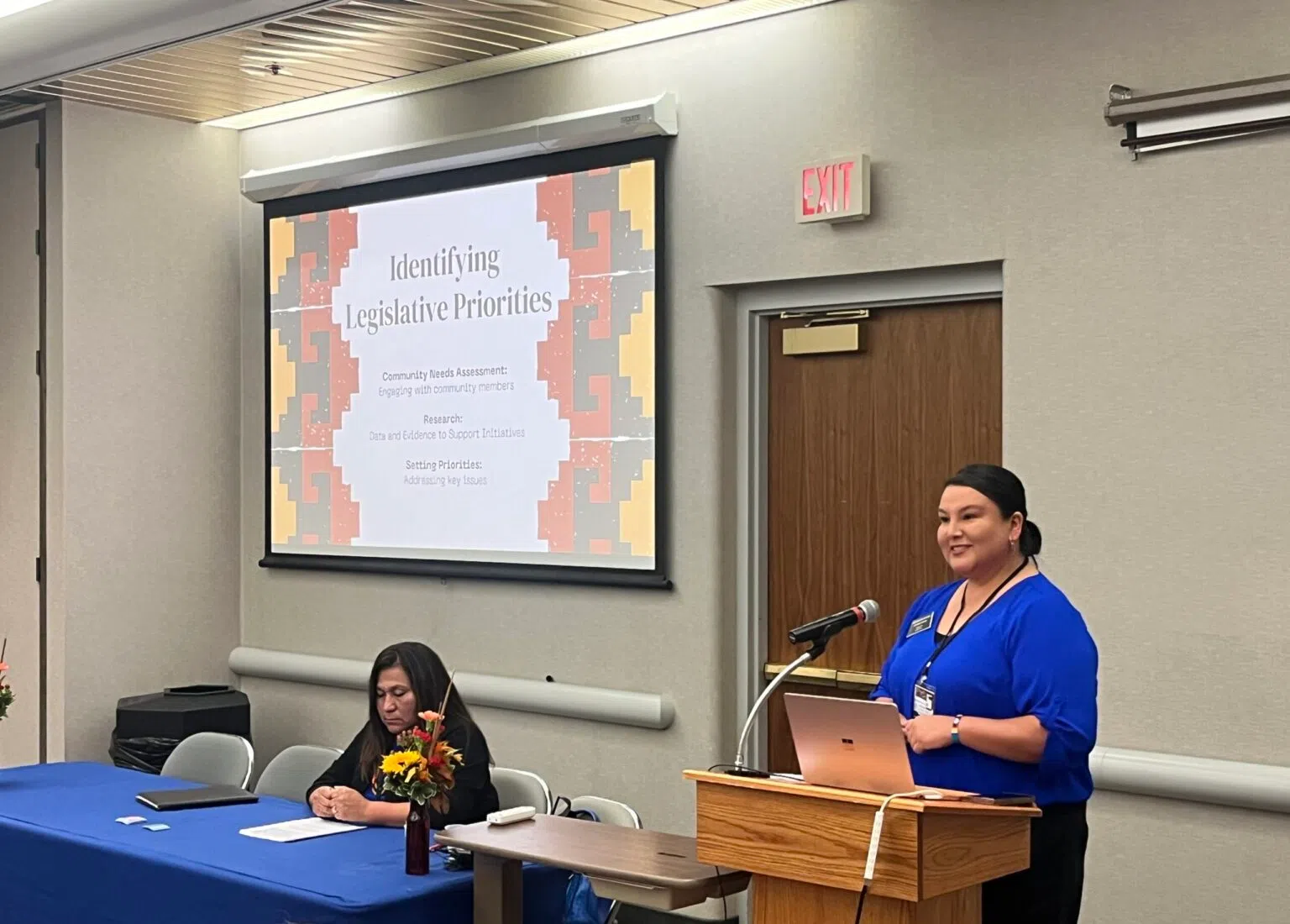
Reps. Jayme Davis, right, and Lisa Finley-DeVille present Sept. 4, 2024, during the Tribal Leaders Summit in Bismarck. (Mary Steurer/North Dakota Monitor)
By: Mary Steurer
BISMARCK, N.D. (North Dakota Monitor) – The five Native nations in North Dakota need to step up their state government lobbying efforts, state Rep. Jayme Davis said.
The Rolette Democrat joined Rep. Lisa Finley-DeVille, D-Mandaree, for a presentation on the legislative process Wednesday morning at United Tribes Technical College’s Tribal Leaders Summit. Davis and DeVille are the only two Native lawmakers in the statehouse.
Because of this — and the fact that both are relatively new to the Legislature — it’s difficult to get most state lawmakers to understand the needs of Native North Dakotans, Davis said.
Take North Dakota’s Indian Child Welfare Act, for example. The legislation, which codified provisions from the federal Indian Child Welfare Act into state law, was passed by the Legislature in 2023. Davis brought it to the statehouse amid fears that the U.S. Supreme Court would strike down the federal legislation.
The federal Indian Child Welfare Act has a complex history, Davis said. It was passed in the 1970s to keep Native families intact following decades of separation by federal Indian boarding school and adoption programs.
Few state lawmakers were familiar with the landmark legislation, so it was up to Davis and DeVille to both educate them about the history of the act and to convince them that it deserved to be put in state law. Later that year, the Supreme Court ruled in favor of keeping the federal law in place.
“It can’t just fall on the two of us,” said Davis, a citizen of the Turtle Mountain Band of Chippewa. “We can’t shoulder all the things that are on the table when it comes to the impact of Indigenous communities.”
Tribes should be strategic about which issues need the most attention, and what legislative changes would have the biggest impact, said Davis.
“I know we all want to solve every problem right away, but unfortunately, that’s not what we do in the state Legislature,” she told the crowd. “We take it piece by piece.”
It also means being persistent, and taking the time to form relationships with state government officials.
Davis brought up the 2023 legislation allowing the state government and tribes to share revenue from alcohol sales tax. Native leaders worked for 10 years to implement the tax plan, she said.
The Mandan, Hidatsa and Arikara Nation earlier this year became the first tribe to sign the tax sharing agreement with the state.
“Over time, these relationships create the opportunity to have a deeper dialog, more significant influence and better policy outcomes,” Davis said.
Davis she’s planning to introduce a bill during the 2025 legislative session that would require the state government to consult with Native leaders when lawmakers consider legislation that would affect tribes in North Dakota.
She pointed to a bill passed in 2023 that reversed a longstanding vehicle excise tax exemption for tribal members living on reservations.
Without the exemption in place, those tribal members are now on the hook to pay more money when they purchase cars in North Dakota. Despite that the measure had a significant impact on the tribes, Davis said they were not consulted on the bill.
Davis acknowledged that both she and DeVille voted in favor of the bill, but said that they only did so because they thought they would have a chance to advocate for amending it before it was signed into law. Davis tried unsuccessfully to have the Legislature revisit the issue during the special session last year.
“When the bill passed, I got phone calls the next day, and I know our tribal leaders got phone calls saying, ‘Hey, why the heck do I have to pay taxes now on this car?’” Davis said.
She said she and tribal leaders hope to reverse the change in the future.
DeVille, a member of the Mandan, Hidatsa and Arikara Nation, said she also faces challenges advocating for Native constituents during the session.
She said she’s pushed for legislation calling on the state to study oil and gas pollution on Native land, but none have been successful. DeVille is also a founder of an environmental advocacy group, Fort Berthold Protectors of Water and Earth Rights.
“All of my resolutions, they failed because our state is pro-energy,” she said. “No matter what, I’m going to keep trying.”
A member of the audience asked whether or not there was an easy way to track all legislation related to tribal issues, noting that she found the state Legislature’s difficult to navigate.
The Indian Affairs Commission tracks legislation that impacts Native tribes during the session, Davis said.




Comments